Serial Experiments Lain in the Modern Age of Social Media and the Internet
Serial Experiments Lain was a 1998 cyberpunk anime series directed by the late Ryutaro Nakamura, with a screenplay by Chiaki J. Konaka, character designs by Yoshitoshi ABe, and produced by Yasayuki Ueda. It remains among the most distinctive anime TV series of the late 90’s with its heavily experimental style, deliberately confusing narrative, and existential themes. The show has long since been a critical darling, winning an Excellence Prize in the 1998 Japan Media Arts Festival among other accolades, and is also a fan favorite among the intellectual crowd. It is a milestone of the medium, and a consummate work of science fiction. The series was so well regarded that in 2012 Funimation released a lavish Blu-ray/ DVD special edition which included a book of concept art and another of colored illustrations, something that the company had not done for any of its previous Geneon acquisitions.

It is also an interesting example of how a piece of art can be reflective of modern trends and issues in spite of its age. The show was made in a time when the internet was still in its early stages, and technology was a far cry from what it is today. A time when computers were still clunky and intimidating, and things like iPhones were at most a distant daydream of a concept. Yet its themes concerning communication and identity through digital interface remain as potent as they were when the show was first aired. In fact, given how prevalent digital communication is in modern life, the series may be more relevant than ever.
Connection through Digital Means
One recurring theme in Serial Experiments Lain is connectivity through the internet, or as it is called in the show, the Wired. Through the Wired, people are able to communicate with each other through computers (called Navi), or other digital devices, some eerily similar to modern smartphones. This allows people to communicate with one another or search through the Wired from virtually anywhere and at any time. While they are in class and cannot speak with one another, the titular character Lain and her friends communicate with each other using their digital devices. Gossip on the Wired spills into the real world, often becoming part of casual conversation. People use the Wired to vent their feelings, or spread rumors. This is a strikingly reflective of how people utilize digital communication; what with all the forms of social media such as Twitter, Instagram, Facebook, etc. which people use to share their thoughts and communicate with each other. Sure, the formatting of the Wired may not look the same and perhaps might not function in exactly the same way, but the parallels are clearly there.
At the beginning of the show, Lain was shown to be reclusive and not at all knowledgeable about the Wired. She spends a lot of time keeping to herself and seldom talks to anyone outside of her family except a girl in her class named Alice. Lain is occasionally teased by some of Alice’s friends for being ignorant about the on-goings of the Wired and told by her father that she ought to learn how to use the Wired to keep in touch with other people. In a sense, Lain is being left out because of her ignorance concerning digital communication. As the series continues and Lain becomes more adept at using the Wired as a means of communication, she is shown to be both bolder and more social. She ultimately becomes more knowledgeable of the Wired than any other character in the show. By learning to utilize the Wired, Lain has become more socially savvy, more connected to everyone else. This is something we see very often on the internet nowadays, people who use social media are up-to-date with all the little trends and social happenings while people who do not are left out of the loop. A person’s online presence and awareness of the on-goings of the internet have become a large factor of their social standing in the modern world. In the first episode, Lain’s father says “You’re in junior high now. Your friends are leaving you in the dust, right?” referring to Lain’s unfamiliarity with the Wired. The irony of this statement is that we are now living in a world where kindergarteners play on tablet computers.
One interesting aesthetic of the show is the Wired itself, which Lain seems to literally dive into. The Wired is typically depicted as surrealistic world filled with black space and half-formed images. Users in the Wired are usually shown as incomplete human bodies or parts of human bodies (except Lain, but we’ll get to that later).
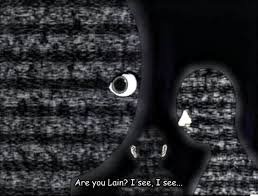
This indicates that only a portion of a person can be seen on the Wired, and therefore a person cannot truly be known through digital communication. At the time the show was made, the internet did not have the functionality it possesses today, meaning there was very little capability for personalization. Granted, this a depiction of the internet that is not entirely relevant today, after all we see peoples’ names and faces on sites like Facebook. However, there still is a great sense of anonymity online. Rarely do people use their actual names on forums or even on popular sites like Youtube. More often than not, you will not know the mass majority of people you come in contact with through the internet, you will only see who they present themselves to be. Even when someone is using their actual name and real photos, they can still alter the content of their profile to present themselves in a manner of their choosing. The incomplete forms Lain encounters on the Wired are a fascinating visual representation of the obscured images we have of people that we only interact with online.
Oversaturation of Information
As mentioned earlier, Serial Experiments Lain is a very confusing show, and deliberately so. It is a show rife with technobabble, philosophical ramblings, conspiracy theories, psudoscience, and extremely strange imagery. As Lain investigates the strange occurrences on the Wired which are affecting the real world, and whether or not there is a god in the Wired, she comes into contact with an endless stream of uncensored thoughts, ideologies, and rumors. The show throws so much information at the viewer, and yet remains vague about what it all means. This makes the show a difficult one to navigate.
However, by doing this, the show is able to depict a network that oversaturated with information. The Wired, like the internet, is a network made to connect people and allow them to share their ideas and knowledge with each other. It is a forum where someone can state their innermost thoughts, views on the world, or just about anything else freely, while also staying anonymous. This is both a wonderful thing and a dangerous thing. It is convenient to have such a fountain of information at your fingertips. If you are curious about something, you can simply look it up online. If you are seeking a second opinion on a certain issue, you needn’t look further than the screen on your digital device. There is a downside to this, of course. With so much information floating around the network, it becomes difficult to tell what is credible and what is misinformation. Only extensive research can give any assurance; however, as Lain’s search for answers in the Wired demonstrates, even then things may not be completely clear. This is an even bigger conundrum now than when the show was made because the internet is a much bigger place. The show was made in the midst of the dot-com boom of the late 90’s, so the internet was certainly growing but the use of it was nowhere near as wide-spread as it is today. At the time, the internet was a nesting place for conspiracy theories that came from uncertainties of the incoming new millennia. Serial Experiments Lain‘s focus on these theories is what makes it timely to the late 90’s. However, the information overload depicted in the show is reflective of the information available on the internet in the modern day.
Identity in the Wired
In the Wired, only Lain seems to be able manifest a full human-form avatar. Furthermore, it seems as if there are multiple versions of Lain floating around the Wired, and Lain herself seems to be constantly present on the network. Indeed, every other character in the show has a different perception of Lain. At the end of the series it is revealed that Lain is anything but the shy middle-school girl we met at the beginning of the show, possibly being a sentient computer program or even the god in the Wired she was searching for. It is a strange conclusion that leaves itself open to an infinite number of interpretations.
This might sound very strange, and it is, but it is also oddly relatable in a world where people are at least somewhat defined by their actions online. When Lain is confronted with the possibility of another version of herself on the Wired, she is understandably rattled. This idea sends her into a state of existential dread, as she tries to reassure herself is the one and only version of herself, even as doubts start to haunt her thoughts. Rumors and gossip about the exploits of this other Lain spread like wildfire through both the Wired and the real world, giving her a reputation the truly precedes her, which only further feeds her doubts and worries concerning her identity. Lain is even accused of sharing her friend Alice’s sexual fantasies on the Wired. This all culminates in Lain losing her sense of belonging amongst her peers in school, and in the real world in general.
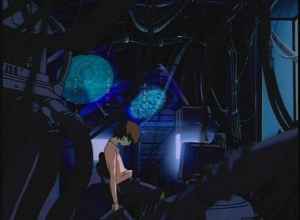
Though perhaps more extreme than any real-life cases, Lain’s story is indicative of how social media can affect a person’s self-perception, relationships and reputation. When we post something online or have something posted about us, it is put out in the open to be seen. We create an online persona, becoming digital beings in a sense, yet our conduct on the web can have consequences in our real lives. The things we say online can be perceived and interpreted in any number of ways. An off-hand comment about an acquaintance can have serious repercussions depending on how it is taken. Online rumors and gossip can damage a person’s reputation. The consequences of what is said and done on the internet are not confined to the internet, they can have effects in the real world. Online harassment and online bullying has become a serious issue in the world of social media, and has even lead to some individuals to commit suicide. This is because by participating in social media and creating an online persona we are essentially making an extension of ourselves, our identities and egos are attached to our Facebook and Twitter and any other online accounts even if we say otherwise. While Serial Experiments Lain’s depiction of the consequences of online communication are strange and certainly not entirely accurate, they nonetheless resonate with the modern issues involved with social media.
Serial Experiments Lain is a complexly layered and multi-faceted work of animated art, and I’m only scratching the surface of it here. Yes, it is a confusing and perhaps even alienating experience but it’s also a deeply fascinating contemplation of the effects technology can have on identity, personal relationship, and society as a whole. This article is not made to imply that the creators somehow foresaw how social media would evolve as technology improved, after all, there are quite a bit of differences in the technology of the show with that of the modern day. Instead, it is meant to illustrate how a work of art can be interpreted in light of the current social, and in this case technological, state of the world.
What do you think? Leave a comment.


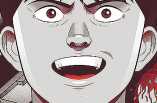
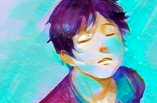

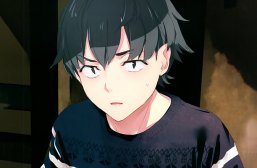

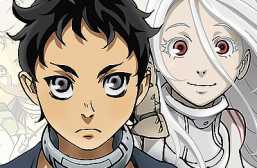
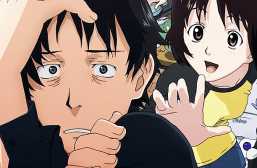
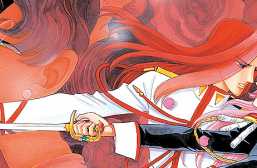

Only problem I had with it is that you don’t understand what’s going on almost till the end. Animation is rather ‘lazy’, a lot of blurry and frozen shots. The whole series is just a set of sketches, scenes and pieces thrown together, no transition between them.
I have watched some other highly praised anime, like “Evangelion”, “Haibane Renmei”, “Planetes”, most of Ghibli movies, Makoto Shinkai’s and Mamoru Oshii’s works etc. And to me most of them are better than “Lain”.
It’s all a matter of personal taste. I prefer the weird, confusing qualities of Lain to the more straightforward fantastical anime.
Well, as Dupont said, it’s a matter of personal taste. Though I do like most of the shows you mentioned.
Haibane Renmei, which has some of the same team behind Serial Experiments Lain, is one of my all-time favorites along with Lain. Between the two, it is the more easily accessible and understandable, but Lain was never trying to be wholly coherent and made an art form of confusing its audience. An interesting review I read said that Haibane Renmei speaks to the spirit, while Serial Experiments speaks to the mind.
I love this series. It’s enjoyable. It’s trippy. It’s a mystery.
One of my favorite aspects of this show is that it is very accessible to a western audience.
I wish someone would make another show in general like this. I don’t think that i’ve ever seen another series that addressed such a large amount of philosophy so well. On top of that the questions it asks are as relevant today as they were years ago. It is truly an amazing show.
I find it to be far more relevant to today than it was to the infancy of the Internet, but it could have still been taken as a strong warning of where we were headed as a society at the time.
I first saw this around ten years ago when I was a wee child/young teenager and even though the storyline obviously went over and beyond my head I still found this to be a spectacular and distinctive series.
Sure, the drama is missing. EVA was perfect for that, but I found Lain to be more surrealistic and unorthodox… kind of akin to a David Lynch film, but even then it’s more complex and convoluted than that. In retrospect, this anime was way ahead of its time.
I haven’t really watched anime lately. But this has been my favorite Japanese show for years. I’m also a fan of:
Niea_7
Texhnolyze
Paranoia Agent
FLCL
Boogiepop Phantom
Haibane Renmei
Wow great article. There is an anime from the same director of lain (ryutaru nakamura) and writer of lain (chiaki konaka) and mangaka of ghost in the shell (masamune shirow) called “ghost hound”. It was made in 2007 and it is as philosophical as lain but focusing on spiritual matters.
This anime is so weird and creepy .. I think that’s why I liked it lol. The music, Lain’s voice (english – she sounds so weird) – the anime is just really strange but it makes you keep watching. I liked episode/layer 9 a lot. It’s slow but eventually gets there.
I love Lain, but it does have some problems. First and foremost is in its pacing. I have no problem with slow (I love Texhnolyze), but Lain feels sometimes as if it’s not even moving, to the extent you wonder how it gets from point A to point B. A great example is how we go from Lain working on her Navi to all of a sudden having a monstrous setup within her room. Also, the ending seems a bit forced. Like at times they tried to cram too much in, while stretching some parts out. I also thought the final encounter between Eiri and Lain was rather weak. Finally, while Lain touches on a wealth of ideas, it doesn’t seem to ever really expand or elaborate on them.
More than anything I love Lain for its visuals and the hypnotic, rich world it creates. But as a complete, narrative work it has problems that prevent me from calling it amazing.
The thing that makes it good anime to my mind is that you can be watching it and forget its animated because you get so caught up in the story and general weirdness of the series. I hadn’t enjoyed an anime series until I found SE:Lain and simply picked it up on the basis it was a philosophical & trippy sci-fi.
It’s amazing people can say crap like One Piece or Naruto is the best anime out there with stuff like Lain and Eva.
I’m not the most avid of anime fans, I tend to watch those films and series that perhaps stand out from the rest and I would definitely consider Lain to be one of these. I honestly don’t think it’s that dated to be honest, especially considering that it’s perhaps based on a different form of internet; one that perhaps owes more to the original concepts of the net – as explained in one episode – rather the way that net appears to be moving towards. In fact if anything, this tends to be more appropriate as it means that it’s hard to actually pin down the series to a specific time and place.
As far as I am concerned, this is right up there with eva as one of the best anime series ever made….
I think it is a pretty good conteder for the title but it falls short. I think it would have been better if it had come along a few years later. Some of what they depicted in their vision of what is to come of the internet seemed a little naive in places. I think if Lain had come out today it would have been a little bit better.
This is no doubt the best anime I’ve ever seen, and along my absolutely top favorite movies/series/TV shows.
Sorry for being too lazy to write any long comment here. I’ve really been thinking insanely much about Lain, I really can’t handle explaining my feelings about it right now.
Watching Serial Experiments Lain requires your full attention and a lot of patience, and while some people love it with all their heart (like me), others will not find it that good at all.
If you’re able to become obsessed about certain topics, speculating a lot about questions like “What is existence?”, “Who am I?” and “What if there is another world out there?”, this could maybe be an experience for lifetime.
My friends & I always refer to the image of the room with all the computers and the liquid cooling in her house late in the show. There’s something so over the top about the connectivity and the almost religious immensity of the technology, it’s just so ridiculous and awesome. Wild show, nice read!
Interesting post mate. This is definitely my favourite anime, and one of my favourite media productions of all time…
I have never heard of this anime before but I think I might have to give it a shot.. it is interesting how eerily prophetic the show was.
Haven’t seen this show, but I’m curious as to how this show and its themes fits into its own historical context in the 90s, rather than as a past vision of our present. Fear of & fascination with technology seems to be a common theme in anime, particularly in the 90s 00s (thinking mainly of Evangelion, Cowboy Bebop, Ghost in the Shell). I think you’re right in pinpointing identity and information saturation as major issues. Great read!
I think Lain is one of my top five animes to date, and I say to date, because you never know what the future will bring!
I’m glad that more and more people are discussing Lain these days. When I first watched it, about 5 or 6 years ago, no one spoke of it at all.
To me, the show needs to be placed in the airing year: before Facebook and Twitter, before 911, before Radiohead’s prophetic Kid A, before every household started to have a computer. It is in that time that Lain was presented to us, almost like a warning of what was to come when internet became a commodity that everyone had access to.
I haven’t thought about Lain in years, so I found this to be a really interesting topic. Like many others, I had a hard time grasping a lot of the series’ themes when I first watched it back in high school. At the time, it seemed so far removed from my understanding of technology and the internet that I found it difficult to connect its questions to anything real. Re-evaluating it from today’s perspective is an incredibly smart move though. Your discussion on identity, in particular, gave me a deeper appreciation for the series and its relevance to contemporary life. It seems a second viewing is in order.
I find it interesting how you drew the parallels between the show and modern life. Really puts it in a different perspective.
I remember watching Lain lat year. When you get down to it, it confusing at first, but the story seem to make sense to me somewhere in the middle of the plot. It had a very intimidating and dark atmosphere and the odd silences between scenes in the show jut added that sense of uneasiness.
I keep trying and keep getting lost in this. I will have to watch it midday, your paying put this back objectification my radar.
I actually just completed watching this series not too long ago, and it was indeed difficult to follow, looking at how others interpreted it kind of helped better my understanding of the story.
Towards the end of the show Lain is trying to figure out which version of herself is the real one. Troubled for reassurance and yet aware of her omnipotence, Lain appears to be, in my opinion, the most humanistic character in the show.
In an interaction between Lain and her best friend Alice, Lain describes herself as software computer program, and the all the human beings in the material world as applications.
In the human world, Lain is projected as a shy and innocent girl, a girl who has doubts and fears, craves unconditional love and wants to understand herself and the world she lives in, much like how we do in our own lives.
In the wired there were different versions of Lain, as Lain herself is quite complex.
It’s true that through social media we alter our personalities to project the version of ourselves that we believe to be best suited for the situation at hand, if someone makes a mistake, suddenly personal or false information or identification of ones self has just been exposed for billions of unseen eyes and can seldom be undone.
Even if someone feels that who they are projecting is indeed a false pretense, perhaps, there may still be some truth to that self yet. After all, we seek reassurance from others about ourselves just as Lain did, and events around us can help shape and manifest those doubts and concerns.
Overall, I thought the series was brilliant, and your article thorough and enjoyable.
I remember when I watched this anime, it left me confused and puzzled about what is going on and how can the events be interpreted. This article has clarified some gaps for me especially in regard to the impact of social media on our identity.
i first caught this anime as a kid, it was playing late night on tech tv’s anime block.. couldn’t have been any later than 2000. it stuck with me. one of the best of the 90s IMO. the style almost reminds me of seiichi hayashi’s classic experimental manga red colored elegy.
Let’s all love Lain.